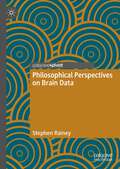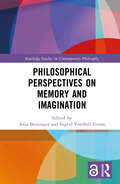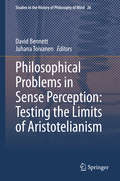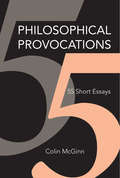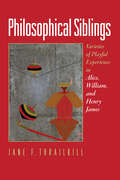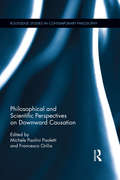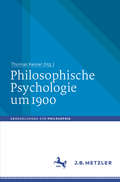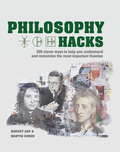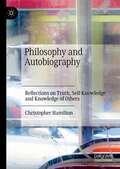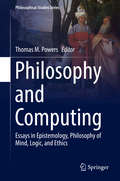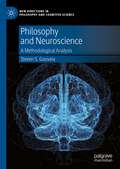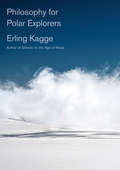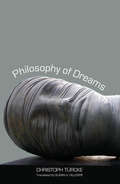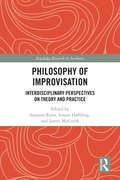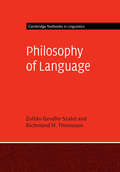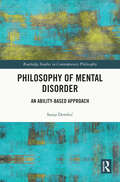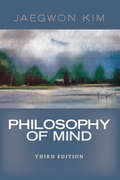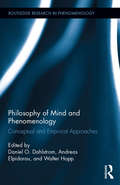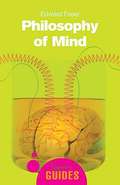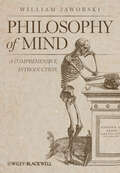- Table View
- List View
Philosophical Perspectives on Brain Data
by Stephen RaineyWhere there is data there are questions of ownership, leaks, and worries about misuse. When what’s at stake is data on our brains, the stakes are high. This book brings together philosophical analysis and neuroscientific insights to develop an account of ‘brain data’: what it is, how it is used, and how we ought to take care of it. Emerging trends in neuroscience appear to make mental activity legible, through sophisticated processing of signals recorded from the brain. This can include Artificial Intelligence (AI), with algorithms classifying brain signals for further processing. These developments will have ramifications for concepts of the brain, the self, and the mind. They will also affect clinical practices like psychiatry, by modifying concepts of mental health and introducing AI-based diagnostic and treatment strategies. The issues arising are vastly complicated, little understood, but of high importance. Philosophical Perspectives on Brain Data clarifies complex intersections of philosophical and neuroscientific interest, presenting an account of brain data that is comprehensible. This account can be the basis for evaluating practices based on brain data. As such, the book aims to open a novel space for evaluating hitherto arcane areas of academic research in order to provide the necessary scope for understanding their real-world consequences. These consequences will include personal, socio-political, and public health dimensions. It is therefore vital that they are understood if their impacts upon aspects of everyday life can be evaluated adequately.
Philosophical Perspectives on Memory and Imagination (Routledge Studies in Contemporary Philosophy)
by Anja Berninger Íngrid Vendrell FerranThis book explores the structure and function of memory and imagination, as well as the relation and interaction between the two states. It is the first book to offer an integrative approach to these two emerging areas of philosophical research. The essays in this volume deal with a variety of forms of imagining and remembering. The contributors come from a range of methodological backgrounds: empirically minded philosophers, analytic philosophers engaging mainly in conceptual analysis, and philosophers informed by the phenomenological tradition. Part 1 consists of novel contributions to ontological issues regarding the nature of memory and imagination and their respective structural features. Part 2 focuses on questions of justification and perspective regarding both states. The chapters in Part 3 discuss issues regarding memory and imagination as skills or abilities. Finally, Part 4 focuses on the relation between memory, imagination, and emotion. Philosophical Perspectives on Memory and Imagination will be of interest to scholars and advanced students working in philosophy of memory, philosophy of imagination, philosophy of mind, and epistemology.
Philosophical Problems in Sense Perception: Testing the Limits of Aristotelianism (Studies in the History of Philosophy of Mind #26)
by David Bennett Juhana ToivanenThis volume focuses on philosophical problems concerning sense perception in the history of philosophy. It consists of thirteen essays that analyse the philosophical tradition originating in Aristotle’s writings. Each essay tackles a particular problem that tests the limits of Aristotle’s theory of perception and develops it in new directions. The problems discussed range from simultaneous perception to causality in perception, from the representational nature of sense-objects to the role of conscious attention, and from the physical/mental divide to perception as quasi-rational judgement. The volume gives an equal footing to Greek, Arabic, and Latin philosophical traditions. It makes a substantial contribution not just to the study of the Aristotelian analysis of sense perception, but to its reception in the commentary tradition and beyond. Thus, the papers address developments in Alexander of Aphrodisias, Themistius, Avicenna, John of Jandun, Nicole Oresme, and Sayf al-Din al-Amidi, among others. The result of this is a coherent collection that attacks a well-defined topic from a wide range of perspectives and across philosophical traditions.
Philosophical Provocations: 55 Short Essays
by Colin McGinnPithy, direct, and bold: essays that propose new ways to think about old problems, spanning a range of philosophical topics. In Philosophical Provocations, Colin McGinn offers a series of short, sharp essays that take on philosophical problems ranging from the concept of mind to paradox, altruism, and the relation between God and the Devil. Avoiding the usual scholarly apparatus and embracing a blunt pithiness, McGinn aims to achieve as much as possible in as short a space as possible while covering as many topics as possible. Much academic philosophical writing today is long, leaden, citation heavy, dense with qualifications, and painful to read. The essays in Philosophical Provocations are short, direct, and engaging, often challenging philosophical orthodoxy as they consider issues in mind, language, knowledge, metaphysics, biology, ethics, and religion. McGinn is looking for new ways to think about old problems. Thus he writes, about consciousness, “I think we have been all wrong,” and goes on to suggest that both consciousness and the unconscious are mysteries. Summing up his proposal on altruism, he remarks, “My suggestion can now be stated, somewhat brutally, as follows: human altruism is the result of parasitic manipulation.” He takes a moment to reflect: “I really don't know why it is good to be alive, though I am convinced that the standard suggestions don't work.” McGinn gets straight to the point and states his position with maximum clarity. These essays offer provocative invitations to think again.
Philosophical Siblings: Varieties of Playful Experience in Alice, William, and Henry James
by Jane F. ThrailkillAlice James: an exemplary nineteenth-century neurasthenic and diarist. William James: a foundational figure for American psychology and philosophy. Henry James: a preeminent author and literary critic. These three iconic figures of nineteenth-century American culture and letters were also siblings, children of the storied James family, yet the diarist, the psychologist, and the novelist have seemed to occupy distinct realms of cultural authority and to speak to different audiences (or, in the case of Alice, to no audience at all). Their writings have rarely been considered together.In Philosophical Siblings Jane F. Thrailkill asks what new story is illuminated when we study their writings collectively. By approaching the Jameses as intimate thinkers operating on a common field of play, Thrailkill reveals the siblings' shared project—part psychological, part philosophical—of showing how minds meet in a world teeming with possibilities and risks. Scientists in nineteenth-century psychology labs were studying isolated individuals, tracking eye movements, and timing reactions to better understand the human machine. In contrast, the Jameses' models for discovery were philosophical toys: ludic devices that light up quirks of perception and are devilishly fun as well. With childlike humor, the siblings' intellectual playfulness is both message and medium, manifested in an expressive style that exploits incongruity, delights in absurdities, and sometimes, teasingly, inflicts the sting of critique.Most important, the Jameses' writings model how human beings accomplish high-wire acts of perception and creation. Alice, William, and Henry James did not merely present a new, interactive theory of mind; they dramatized it in their writings as a curiosity-based practice. Philosophical Siblings accepts their invitation to mindful play and offers a fresh way of thinking about literary encounters more generally, one that approaches even the weightiest texts with serious lightness.
Philosophical and Scientific Perspectives on Downward Causation (Routledge Studies in Contemporary Philosophy)
by Francesco Orilia Michele Paolini PaolettiDownward causation plays a fundamental role in many theories of metaphysics and philosophy of mind. It is strictly connected with many topics in philosophy, including but not limited to: emergence, mental causation, the nature of causation, the nature of causal powers and dispositions, laws of nature, and the possibility of ontological and epistemic reductions. Philosophical and Scientific Perspectives on Downward Causation brings together experts from different fields—including William Bechtel, Stewart Clark and Tom Lancaster, Carl Gillett, John Heil, Robin F. Hendry, Max Kistler, Stephen Mumford and Rani Lill Anjum —who delve into classic and unexplored lines of philosophical inquiry related to downward causation. It critically assesses the possibility of downward causation given different ontological assumptions and explores the connection between downward causation and the metaphysics of causation and dispositions. Finally, it presents different cases of downward causation in empirical fields such as physics, chemistry, biology and the neurosciences. This volume is both a useful introduction and a collection of original contributions on this fascinating and hotly debated philosophical topic.
Philosophie des Geistes und der Kognition: Eine Einführung
by Gottfried Vosgerau Nicolas LindnerWas ist der Geist und wie funktioniert er? Die Philosophie des Geistes hat sich im Laufe der zweiten Hälfte des 20. Jahrhunderts – neben der Erkenntnistheorie und der Metaphysik – zu einer der zentralen Subdisziplinen der Theoretischen Philosophie herausgebildet. Das Lehrbuch behandelt nicht nur die klassischen Themen der Philosophie des Geistes, sondern stellt auch die neuesten Entwicklungen in Grundzügen vor. Dazu gehören Diskussionen zum Verhältnis des Geistes zum Körper und zur Umwelt, das Verständnis Anderer, Emotionen sowie das Verhältnis von Denken und Sprache. In erster Linie richtet sich das Lehrbuch an Personen, die mit dem Philosophiestudium angefangen haben oder sich einfach einen Überblick über philosophische Fragen und Diskussionen rund um den Geist und unsere geistigen Fähigkeiten verschaffen wollen. – Mit Definitionen, Beispielen und Literaturhinweisen sowie übersichtlichen Zusammenfassungen zur Selbst-Überprüfung.
Philosophische Psychologie um 1900 (Abhandlungen zur Philosophie)
by Thomas KesselDieser Band stellt die eigentümlichen Mischungsverhältnisse natur- und geisteswissenschaftlicher Perspektiven im Feld der philosophischen Psychologien um 1900 ins Zentrum. Diese Konzeptionen, die den engen Rahmen des Psychologismus-Streites überschreiten und ihn gleichwohl kontextualisieren, werden durch Beiträge zu Franz Brentano, Wilhelm Dilthey, Carl Stumpf, Theodor Lipps, Wilhelm Wundt, Oswald Külpe, Edmund Husserl, Wilhelm Windelband, Paul Natorp und Nicolai Hartmann repräsentiert.
Philosophy Hacks (Hacks Ser.)
by Robert Arp Martin CohenDiscover the simple way to understand and remember the most groundbreaking concepts in 3,000 years of philosophical thought. Each idea is broken down into three stages: 1/ The helicopter view, which gives you an introduction to the idea, and some context around it. 2/ The shortcut, which gives you the core elements of the theory, along with a range of examples that everyone can understand. 3/ The hack, which is a one-liner designed to stick in your memory and give you an instant grasp of the concept.From Pascal's Wager to Kant's categorical imperative, and from Camus's Existential Nihilism to Arendt's Banality of Evil, there are 100 concepts explained. The perfect introduction to philosophy, this is a great new way to learn about the most important philosophical ideas and concepts in a way that makes them easy to recall even months after reading the book.
Philosophy Hacks (Hacks)
by Robert Arp Martin CohenDiscover the simple way to understand and remember the most groundbreaking concepts in 3,000 years of philosophical thought. Each idea is broken down into three stages: 1/ The helicopter view, which gives you an introduction to the idea, and some context around it. 2/ The shortcut, which gives you the core elements of the theory, along with a range of examples that everyone can understand. 3/ The hack, which is a one-liner designed to stick in your memory and give you an instant grasp of the concept.From Pascal's Wager to Kant's categorical imperative, and from Camus's Existential Nihilism to Arendt's Banality of Evil, there are 100 concepts explained. The perfect introduction to philosophy, this is a great new way to learn about the most important philosophical ideas and concepts in a way that makes them easy to recall even months after reading the book.
Philosophy and Autobiography: Reflections on Truth, Self-Knowledge and Knowledge of Others
by Christopher HamiltonThis book, taking its point of departure from Stanley Cavell’s claim that philosophy and autobiography are dimensions of each other, aims to explore some of the relations between these forms of reflection, first by seeking to develop an outline of a philosophy of autobiography, and then by exploring the issue from the side of five autobiographical works. Christopher Hamilton argues in the volume that there are good reasons for thinking that philosophical texts can be considered autobiographical, and then turns to discuss the autobiographies of Walter Benjamin, Peter Weiss, Jean-Paul Sartre, George Orwell, Edmund Gosse and Albert Camus. In discussing these works, Hamilton explores how they put into question certain received understandings of what philosophical texts suppose themselves to be doing, and also how they themselves constitute philosophical explorations of certain key issues, e.g. the self, death, religious and ethical consciousness, sensuality, the body. Throughout, there is an exploration of the ways in which autobiographies help us in thinking about self-knowledge and knowledge of others. A final chapter raises some issues concerning the fact that the five autobiographies discussed here are all texts dealing with childhood.
Philosophy and Computing
by Thomas M. PowersThis book features papers from CEPE-IACAP 2015, a joint international conference focused on the philosophy of computing. Inside, readers will discover essays that explore current issues in epistemology, philosophy of mind, logic, and philosophy of science from the lens of computation. Coverage also examines applied issues related to ethical, social, and political interest. The contributors first explore how computation has changed philosophical inquiry. Computers are now capable of joining humans in exploring foundational issues. Thus, we can ponder machine-generated explanation, thought, agency, and other quite fascinating concepts. The papers are also concerned with normative aspects of the computer and information technology revolution. They examine technology-specific analyses of key challenges, from Big Data to autonomous robots to expert systems for infrastructure control and financial services. The virtue of a collection that ranges over philosophical questions, such as this one does, lies in the prospects for a more integrated understanding of issues. These are early days in the partnership between philosophy and information technology. Philosophers and researchers are still sorting out many foundational issues. They will need to deploy all of the tools of philosophy to establish this foundation. This volume admirably showcases those tools in the hands of some excellent scholars.
Philosophy and Neuroscience: A Methodological Analysis (New Directions in Philosophy and Cognitive Science)
by Steven S. GouveiaThis book explores the methodological strategies for linking philosophy and neuroscience concerning the study of the conscious brain. The author focuses on four distinct methods for relating these two academic disciplines: isolationist, reductionist, neurophenomenological, and non-reductionist. After analyzing the pros and cons of these approaches, Steven S. Gouveia applies them to the concept of Qualia and Information to understand how the metaphilosophical assumptions of each approach influence the definitions of those specific concepts. Gouveia argues for an approach that conceives the interdisciplinarity of both philosophy and neuroscience, in a particular and sound methodology, offering empirical examples of the explanatory power of this methodology over the others. Additionally, he shows how the metaphilosophical assumptions of each methodology—usually taken by researchers implicitly and unconsciously—influence their own approach to the methodological problem.
Philosophy for Polar Explorers: What They Don't Teach You In School
by Erling KaggeA thoughtful, eloquent meditation on bringing adventure and exploration into your daily life, from the author of Silence and WalkingErling Kagge is an explorer par excellence. He has accomplished things that most of us can't even imagine--for example: he's climbed Mount Everest and reached both the North and South Poles on foot. Yet in this slim, inspiring, lyrical book, he teaches us how to apply an explorer's mentality to our own daily lives. Simple things like getting up early and accepting failure can make a difference whether we are battling an arctic storm en route to the South Pole or stuck in traffic on our way to work. And larger lessons, like learning not to chase happiness and being receptive to goals, can benefit our lives enormously.Punctuating these lessons with stories from his own life and travels, Kagge invites readers to treat life like an exploration and illuminates the possibilities that await us when we do.
Philosophy of Dreams
by Susan H. Gillespie Christoph TurckeWhy has humankind developed so differently from other animals? How and why did language, culture, religion, and the arts come into being? In this wide-ranging and ambitious essay, Christoph Türcke offers a new answer to these timeworn questions by scrutinizing the phenomenon of the dream, using it as a psychic fossil connecting us with our Stone Age ancestors. Provocatively, he argues that both civilization and mental processes are the results of a compulsion to repeat early traumas, one to which hallucination, imagination, mind, spirit, and God all developed in response. Until the beginning of the modern era, repetition was synonymous with de-escalation and calming down. Then, automatic machinery gave rise to a new type of repetition, whose effects are permanent alarm and distraction. The new global forces of distraction, Türcke argues, are producing a specific kind of stress that breaks down the barriers between dreams and waking consciousness. Türcke’s essay ends with a sobering indictment of this psychic deregulation and the social and economic deregulations that have accompanied it.
Philosophy of Improvisation: Interdisciplinary Perspectives on Theory and Practice (Routledge Research in Aesthetics)
by Susanne Ravn; Simon Høffding; James McGuirkThis volume brings together philosophical and interdisciplinary perspectives on improvisation. The contributions connect the theoretical dimensions of improvisation with different viewpoints on its practice in the arts and the classroom. The chapters address the phenomenon of improvisation in two related ways. On the one hand, they attend to the lived practices of improvisation both within and without the arts in order to explain the phenomenon. They also extend the scope of improvisational practices to include the role of improvisation in habit and in planned action, at both individual and collective levels. Drawing on recent work done in the philosophy of mind, they address questions such as whether improvisation is a single unified phenomenon or whether it entails different senses that can be discerned theoretically and practically. Finally, they ask after the special kind of improvisational expertise which characterizes musicians, dancers, and other practitioners, an expertise marked by the artist’s ability to participate competently in complex situations while deliberately relinquishing control. Philosophy of Improvisation will appeal to anyone with a strong interest in improvisation, to researchers working in philosophy, aesthetics, and pedagogy as well as practitioners involved in different kinds of music, dance, and theater performances.
Philosophy of Language (Cambridge Textbooks in Linguistics)
by Zoltán Gendler Szabó Richmond H. ThomasonThis unique textbook introduces linguists to key issues in the philosophy of language. Accessible to students who have taken only a single course in linguistics, yet sophisticated enough to be used at the graduate level, the book provides an overview of the central issues in philosophy of language, a key topic in educating the next generation of researchers in semantics and pragmatics. Thoroughly grounded in contemporary linguistic theory, the book focus on the core foundational and philosophical issues in semantics and pragmatics, richly illustrated with historical case studies to show how linguistic questions are related to philosophical problems in areas such as metaphysics, epistemology, and ethics. Students are introduced in Part I to the issues at the core of semantics, including compositionality, reference and intentionality. Part II looks at pragmatics: context, conversational update, implicature and speech acts; whilst Part III discusses foundational questions about meaning. The book will encourage future collaboration and development between philosophy of language and linguistics.
Philosophy of Mental Disorder: An Ability-Based Approach (Routledge Studies in Contemporary Philosophy)
by Sanja DembićThis book offers an ability-based view of mental disorders. It develops a detailed analysis of the concept of inability that is relevant in the psychiatric and psychotherapeutic context by drawing on the most recent literature on the concepts of ability, reasons, and harm. What is it to have a mental disorder? This book contends that an individual has a mental disorder if and only if (1) they are・in the relevant sense・unable to respond adequately to their available (apparent) reasons in their thinking, feeling, or acting, and (2) they are harmed by the condition underlying or resulting from that inability. The author calls this the “Rehability View.” This view can account for what is “mental” about mental disorders: it is the rational relations among an individual’s attitudes and actions that are “disordered,” and the relevant norms are the norms of reasons. This view is compatible with explanations of mental disorders in terms of biological dysfunctions, without reducing the former to the latter. The aim is not to offer just another conception of mental disorder, but to develop a systematic approach that incorporates insights from the philosophy of psychiatry and adjacent philosophical disciplines. Philosophy of Mental Disorder will be of interest to scholars and advanced students working in philosophy of psychiatry, philosophy of mind, philosophy of action, ethics, and mental health.
Philosophy of Mind
by Jaegwon KimKim (philosophy, Brown U. ) presents an updated third edition of the classic book which presents a concise overview of the philosophy of mind. First introduced by Descartes 400 years ago, philosophy of mind is a broad philosophical approach to consciousness and the mind-body relationship. This introductory work for upper-level philosophy students has been updated with new sections on consciousness as well as an overall improvement of the book's language flow. Annotation ©2011 Book News, Inc. , Portland, OR (booknews. com)
Philosophy of Mind
by Jaegwon KimThe philosophy of mind has long been part of the core philosophy curriculum, and this book is the classic, comprehensive survey of the subject. Designed as an introduction to the field for upper-level undergraduates and graduate students, Philosophy of Mind focuses on the mind-body problem and related issues, some touching on the status of psychology and cognitive science. The third edition has been thoroughly updated throughout to reflect developments of the past decade, and it is the only text of its kind that provides a serious and respectful treatment of substance dualism. This edition also includes two new chapters on the nature of consciousness and the status of consciousness. Improved readability and clarity has been one important aim of the new edition. Throughout the text, author Jaegwon Kim allows readers to come to their own terms with the central problems of the mind. At the same time, Kim's own emerging views are on display and serve to move the discussion forward. Comprehensive, clear, and fair, Philosophy of Mind is a model of philosophical exposition and a significant contribution to the field.
Philosophy of Mind
by Jaegwon KimThe philosophy of mind has long been part of the core philosophy curriculum, and this book is the classic, comprehensive survey of the subject. Designed as an introduction to the field for upper-level undergraduates and graduate students, Philosophy of Mind focuses on the mind-body problem and related issues, some touching on the status of psychology and cognitive science. The third edition has been thoroughly updated throughout to reflect developments of the past decade, and it is the only text of its kind that provides a serious and respectful treatment of substance dualism. This edition also includes two new chapters on the nature of consciousness and the status of consciousness. Throughout the text, author Jaegwon Kim allows readers to come to their own terms with the central problems of the mind. At the same time, Kim’s emerging views are on display and serve to move the discussion forward. Comprehensive, clear, and fair, Philosophy of Mind is a model of philosophical exposition and a significant contribution to the field.
Philosophy of Mind and Phenomenology: Conceptual and Empirical Approaches (Routledge Research in Phenomenology)
by Daniel O. Dahlstrom Walter Hopp Andreas ElpidorouThis volume identifies and develops how philosophy of mind and phenomenology interact in both conceptual and empirically-informed ways. The objective is to demonstrate that phenomenology, as the first-personal study of the contents and structures of our mentality, can provide us with insights into the understanding of the mind and can complement strictly analytical or empirically informed approaches to the study of the mind. Insofar as phenomenology, as the study or science of phenomena, allows the mind to appear, this collection shows how the mind can reappear through a constructive dialogue between different ways—phenomenological, analytical, and empirical—of understanding mentality.
Philosophy of Mind: A Beginner's Guide (Beginner's Guides)
by Edward FeserIn this lively and entertaining introduction to the philospohy of the mind, Edward Feser explores the questions central to the discipline.
Philosophy of Mind: A Comprehensive Introduction
by William JaworskiPhilosophy of Mind introduces readers to one of the liveliest fields in contemporary philosophy by discussing mind-body problems and the various solutions to them. It provides a detailed yet balanced overview of the entire field that enables readers to jump immediately into current debates. Treats a wide range of mind-body theories and arguments in a fair and balanced way Shows how developments in neuroscience, biology, psychology, and cognitive science have impacted mind-body debates Premise-by-premise arguments for and against each position enable readers to grasp the structure of each argument quickly and easily Diagrams and illustrations help readers absorb the more complex ideas Bibliographic essays at the end of each chapter bring readers up to date on the latest literature Written in a clear, easy to read style that is free of technical jargon, and highly accessible to a broad readership The only book to explain systematically how a hylomorphic theory such as Aristotle’s can contribute to current mind-body debates and vie with current mind-body theories Online chapters on free will and the philosophy of persons make the book a flexible teaching tool for general and introductory philosophy courses - available at www.wiley.com/go/jaworski
Philosophy of Mind: Classical and Contemporary Readings
by David J. ChalmersA collection of articles ranging from Descartes to the present, covering the major issues and controversies in the philosophy of mind.
